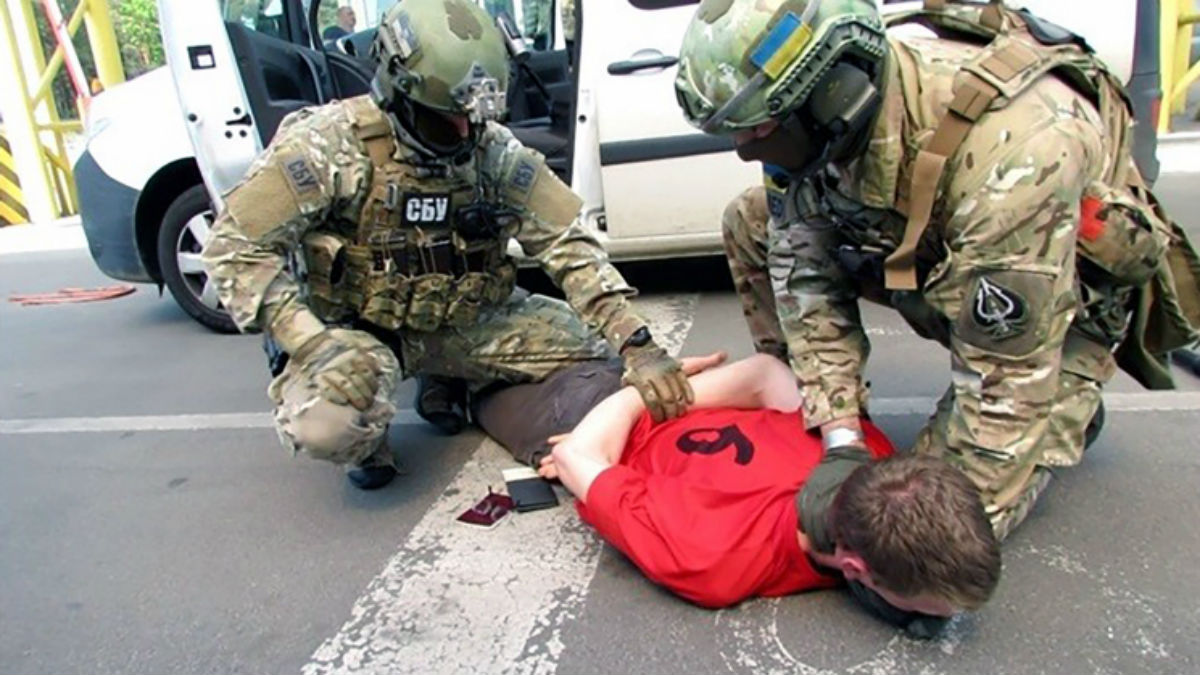Euro 2016: 'Terror plot' foiled by Ukrainian authorities
French 'ultra-nationalist' allegedly planned up to 15 attacks on buildings, bridges and railways

A free daily email with the biggest news stories of the day – and the best features from TheWeek.com
You are now subscribed
Your newsletter sign-up was successful
Ukrainian authorities claim to have thwarted a series of terror attacks planned to coincide with the Euro 2016 football championships starting in France this week.
Vasyl Grytsak, the head of Ukraine's state security service (SBU), told state television that a French "ultra-nationalist" detained on the Ukrainian-Polish border late last month had been planning up to 15 attacks on targets including Jewish and Muslim places of worship, French government administration buildings, bridges, railways and other infrastructure.
Grytsak said the individual, identified as Gregoire Moutaux, had been under surveillance since December and was arrested as part of a sting operation trying to smuggle weapons including rocket propelled grenades, machine guns and explosives into the European Union.
The Week
Escape your echo chamber. Get the facts behind the news, plus analysis from multiple perspectives.

Sign up for The Week's Free Newsletters
From our morning news briefing to a weekly Good News Newsletter, get the best of The Week delivered directly to your inbox.
From our morning news briefing to a weekly Good News Newsletter, get the best of The Week delivered directly to your inbox.
"[He] talked negatively about his government's actions, mass immigration, the spread of Islam and globalisation," said Grytsak.
Investigators also raided Moutaux's house near Nancy in Eastern France, where they found Neo-Nazi T-shirts as well as chemicals used to produce explosives and five balaclavas, says the Daily Mail.
It is understood that Ukraine's security forces had initially planned to keep the investigation a secret until after the tournament, "but decided to go public after reports in international media", says The Guardian.
Extremist attacks have become a "major concern" for French authorities as they prepare to host the month-long tournament, adds the newspaper.
A free daily email with the biggest news stories of the day – and the best features from TheWeek.com
Last week, the US State Department issued a travel warning to Americans planning to visit Europe, urging them to "exercise vigilance" and "avoid crowded places".
French special forces and emergency teams have carried out several practice runs for dealing with an attack during the tournament.
British police will also be stationed at Eurostar terminals and on some cross-channel trains "to prevent trouble and to stop known troublemakers from travelling to the tournament", reports Sky News.
Despite these precautions, British fans will face an "unprecedented security threat" when travelling to France, says the Mail. More than 500,000 are expected to make the trip.
French police have warned that England's opening match against Russia on Saturday in Marseille was "a particularly high risk" after a plot by Islamic State terrorists to target fans was discovered on the computer of one of the attackers responsible for November's Paris attack.
French authorities have extended the state of emergency introduced following last year's atrocities.
-
 Democrats push for ICE accountability
Democrats push for ICE accountabilityFeature U.S. citizens shot and violently detained by immigration agents testify at Capitol Hill hearing
-
 The price of sporting glory
The price of sporting gloryFeature The Milan-Cortina Winter Olympics kicked off this week. Will Italy regret playing host?
-
 Fulton County: A dress rehearsal for election theft?
Fulton County: A dress rehearsal for election theft?Feature Director of National Intelligence Tulsi Gabbard is Trump's de facto ‘voter fraud’ czar
-
 Epstein files topple law CEO, roil UK government
Epstein files topple law CEO, roil UK governmentSpeed Read Peter Mandelson, Britain’s former ambassador to the US, is caught up in the scandal
-
 Iran and US prepare to meet after skirmishes
Iran and US prepare to meet after skirmishesSpeed Read The incident comes amid heightened tensions in the Middle East
-
 Israel retrieves final hostage’s body from Gaza
Israel retrieves final hostage’s body from GazaSpeed Read The 24-year-old police officer was killed during the initial Hamas attack
-
 China’s Xi targets top general in growing purge
China’s Xi targets top general in growing purgeSpeed Read Zhang Youxia is being investigated over ‘grave violations’ of the law
-
 Panama and Canada are negotiating over a crucial copper mine
Panama and Canada are negotiating over a crucial copper mineIn the Spotlight Panama is set to make a final decision on the mine this summer
-
 The rise of the spymaster: a ‘tectonic shift’ in Ukraine’s politics
The rise of the spymaster: a ‘tectonic shift’ in Ukraine’s politicsIn the Spotlight President Zelenskyy’s new chief of staff, former head of military intelligence Kyrylo Budanov, is widely viewed as a potential successor
-
 Why Greenland’s natural resources are nearly impossible to mine
Why Greenland’s natural resources are nearly impossible to mineThe Explainer The country’s natural landscape makes the task extremely difficult
-
 Iran cuts internet as protests escalate
Iran cuts internet as protests escalateSpeed Reada Government buildings across the country have been set on fire